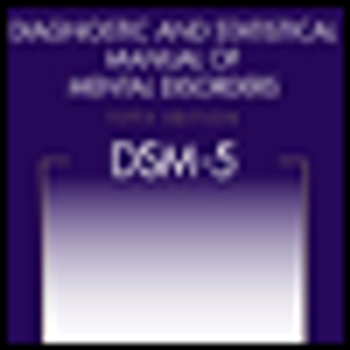
The NIMH Research Domain Criteria (RDoC) project raises many questions about DSM-5 and future DSMs.

The NIMH Research Domain Criteria (RDoC) project raises many questions about DSM-5 and future DSMs.

The thing to remember that there is not a pill for every worry or life problem and that pills can sometimes make things worse.

Writers of diagnostic criteria should consider their work and all its implications. What about adding a new disorder? What might that do to epidemiological capture? Depending on the characteristics of the diagnostic criteria set, many possibilities exist.

In previous blogs and papers, I have done my level best to skewer the misuse of the misdiagnosis "Paraphilia NOS." I regard it as no more than a flimsy justification, concocted to allow the psychiatric incarceration of rapists who would otherwise have to be released from prison to the street.

I was asked three interesting questions by a psychologist with 15 years experience evaluating sexually violent predators. She has testified often--both for the prosecution and for the defense in the hearings that determine the legitimacy of involuntary psychiatric commitment under SVP statutes.

There have been four ringing rejections of the concept of paraphilic rape--in DSM-III, in DSM-IIIR, in DSM-IV, and in a 1999 APA Task Force report. The circumstances surrounding the latter three decisions are fairly well known, the first less so.

In a recent Psychiatric Times blog, Allen Frances engaged a debate with Andrew Hinderliter over the question of change in the diagnostic categories of DSM-5.

One of the impulse-control disorders, Intermittend Explosive Disorder includes serious acts of aggression against person or property that are completely out of proportion to any provocation.

Charles Moser, PhD, MD, has forwarded an interesting suggestion to solve the problem of weak diagnoses that have received a free ride through previous revisions of DSM. His is a middle way intended to steer between the contrasting risks of continuing questionable diagnoses and the risks of eliminating them.

A DSM critic, Andrew Hinderliter sent this perceptive email questioning the wisdom of the most fundamental decision we made in preparing DSM IV-- ie, our goal of keeping the system stable.

In my previous blog, The Missing Person in the DSM, I questioned whether the DSM diagnostic manual classifies psychiatric disorders or the individuals suffering from diagnostic disorders-Ms Smith’s bipolar disorder, or Ms Smith, a person with bipolar disorder.

A large new study from Australia found that DSM-5 would cause a sky-rocketing 60% increase in the rate of alcohol use disorders.

Gary Greenberg, PhD is a psychotherapist, author, teacher, and historian of psychiatric diagnosis. His writings are characterized by penetrating insight, elegant wordsmithing, entertaining story telling, and a dig-deep, no-holds-barred search for underlying meaning.

There have been three positive developments. The rest of the DSM-5 news continues to be extremely worrisome, and time is running out.

Last week, I had a brief, but heated debate with a friend who is on the DSM-5 Task Force. He is strongly supporting a proposed new diagnosis for DSM-5 that I oppose just as strongly.

The New York Times of Dec 20,2010 carried an alarming story. It seems that during the past decade, college students have suddenly become much more mentally ill.

Recently, the Substance Use Disorder Work group of the DSM-5 announced the inclusion of “craving” in the diagnostic criteria for all substance use disorders despite its lack of empirical support from the very analyses conducted by that Workgroup. In addition, no detailed literature review supports the decision to make “craving” a core symptom of Substance Use Disorder syndromes.

Many people associated with DSM-5 have privately expressed their serious doubts to me, but felt muzzled into public silence by constraining confidentiality agreements and loyalty to the process.

Here’s a question. As you sit across from your patient, what or whom are you treating: Ms Smith’s bipolar illness, or Ms Smith, a person with bipolar illness? The DSM leans toward the first choice.

We are delighted that you have appointed a DSM-5 Scientific Review Work Group and charged it with assessing the quality of evidence supporting the DSM 5 proposals.This is great news, probably the last hope to weed out proposals that could do great harm to the Association, our field, and to our patients.

The doctor’s role is to go beyond the obvious and to detect subtle determinants. Good diagnosticians have been trained to look beneath the loud symptom and consider underlying factors.

These issues-among others-raise this question: Is the addition of a new diagnosis such as TDD to DSM-5 the best way to manage the issue of classification of youths with chronic, severe irritability and potential misdiagnosis of bipolar disorder?

As I was driving to work on February 10, 2010, I listened to the National Public Radio host Melissa Block talking about how children labeled “bipolar” may get a new diagnosis. I was shocked that the chair of one of the DSM5 work groups, David Shaffer, MD, would discuss a controversial diagnostic topic with the media.

The ideal field test would study how the diagnostic manual will eventually perform under conditions most closely approximating its future everyday use. The goal is to avoid unpleasant surprises in translation from what has been written on paper to what is practiced in real life. No field test can ever approach the ideal.

Eventually, DSM-5 will be a rushed patch-work. The only hope for a usable DSM-5 is for the Trustees to exert their authority to correct an errant process. But they will act only if there is mounting outside pressure and widespread public concern.